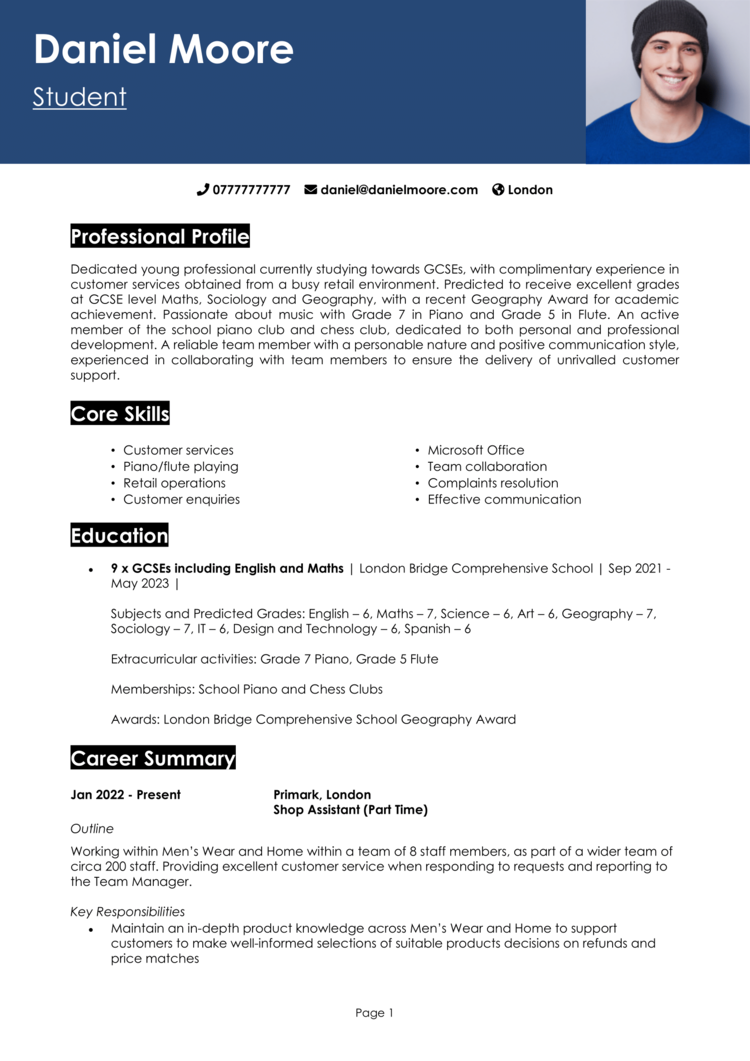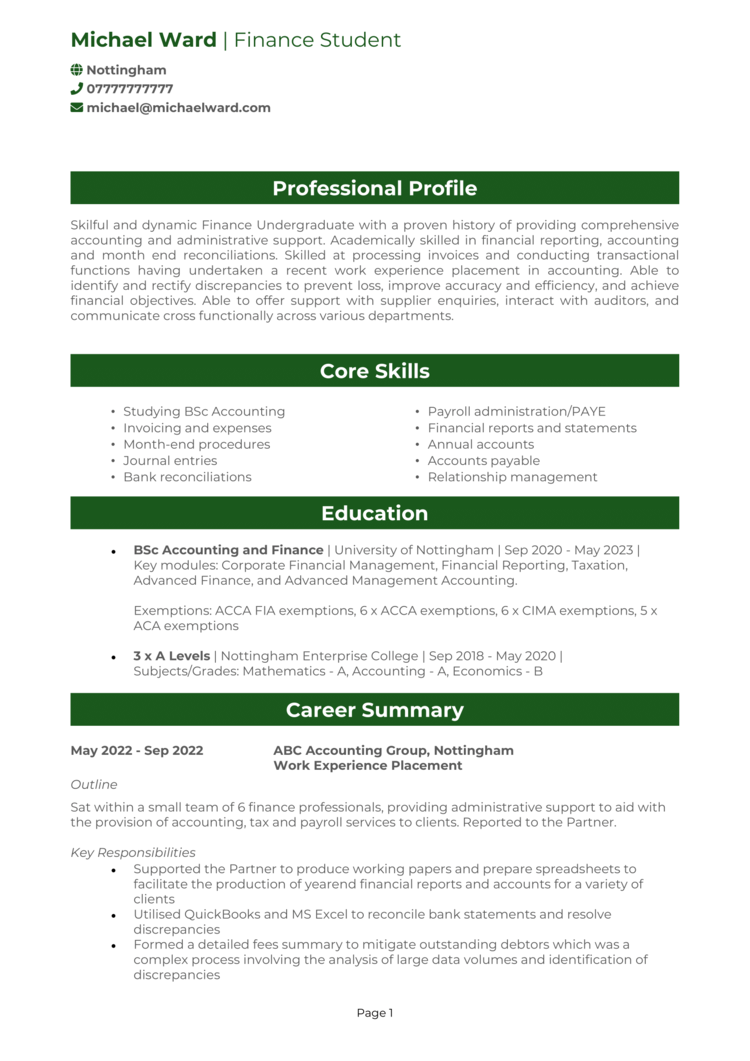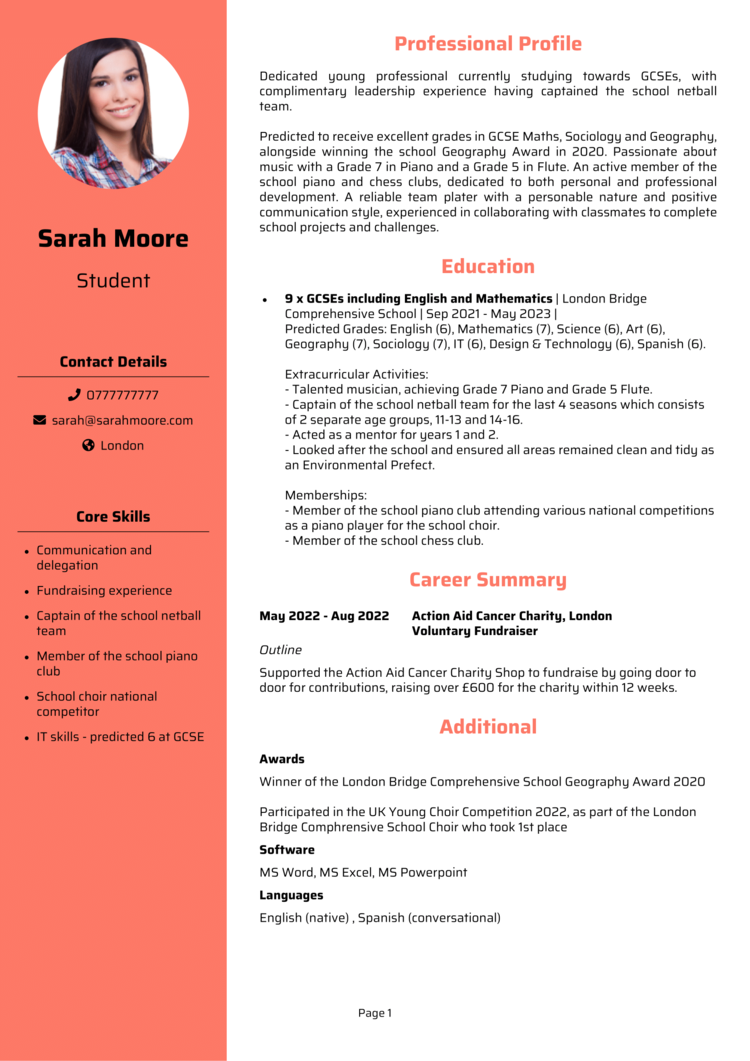Still asking your parents for a tenner every time you want to go out? It might be time to get your first job and show the world (and your wallet) what you’re made of. Whether you’re saving for your first car, a gap year, or just want the independence, it’s time to take the leap into your first job.
But hold up – before you start handing out CVs to every café and retail shop in town, you’ll need a good CV that shows employers you’re serious about working. This guide, complete with teenager CV examples, will help you highlight your skills, personality, and enthusiasm to get you on the career ladder.
Teenager CV example

Finance Student CV example

Student CV example

How to write your CV as a teenager
Learn how to create your own interview-winning CV with this simple step-by-step guide.
A CV for a teenager might not be packed with years of work experience, but that doesn’t mean it can’t stand out. Employers hiring younger workers look for enthusiasm, a willingness to learn, and a spark of personality.
This guide will show you how to write a CV that proves you’re ready for the workplace – even if the only thing you’ve managed so far is the school tuck shop.
CV structure for a teenager


Your CV structure should be as organised as a school timetable. Recruiters need to quickly and easily see the different sections of your CV without struggling to navigate through it.
Structuring your first CV is simple, just follow the below layout:
- Name and contact details – Your contact details go at the top so employers can contact you easily. Including a picture of yourself is optional but rarely needed.
- Profile – Also known as your personal statement: summarise who you are, your ambitions, and why you’re ready to work.
- Core skills – Highlight what you’re great at, like teamwork, time management, or customer service.
- Education – Share your academic achievements, from GCSEs to school awards.
- Work experience – Not having any formal work experience is completely fine: just try to emphasise any volunteering or noteworthy school projects.
- Additional info – Also include any hobbies and interests that show your personality or skills, like playing for a sports team or being part of a drama club.
CV format for a teenager


Your CV might not be brimming with experience, but it should still look professional. A neat, clear layout ensures employers take you seriously. Make sure your CV format avoids preventable mistakes that distract from your talent.
Here’s how to format your first CV:
- Bullet points – Use short lines to describe your skills and experience clearly: recruiters have to look through countless applications, so make your one an easy read.
- Divide sections – Headings and spacing make it easy for employers to navigate the content in your CV.
- Use a clean font – Choose a readable font that looks professional and polished.
- Keep it the right length – A single page or two at most is perfect for a first CV, giving you just enough length to highlight your skills without overloading the reader.
Creating a strong CV profile for a teenager


Your profile, also known as a personal statement, is your chance to introduce yourself to employers. It’s where you explain why you’re eager to work and what makes you a great choice for the role. You need to try to convey to them the benefits of hiring you over someone else.
CV profile examples for a teenager
Profile 1
Motivated student with a strong work ethic and enthusiasm for learning new skills. Experienced in collaborating on school projects and participating in extracurricular activities. Keen to gain hands-on experience in a professional environment and contribute positively to a team.
Profile 2
Eager and adaptable student with experience volunteering in community activities and working on group projects. Proficient in using Microsoft Office and other digital tools. Looking for opportunities to gain practical experience and contribute to an organisation while continuing to learn and grow.
What to include in your CV profile as a Teenager
Here are some tips on what to put in your first CV profile:
- Who you are – Tell the employer a bit about yourself, like what you’re studying or your future goals.
- Your key qualities – Make sure to note things like reliability, enthusiasm, or a willingness to learn.
- Relevant experience – Quickly mention any volunteering, part-time work, or school projects.
- What you’re looking for – Tell the recruiter which type of job you’re after and why.
- Your ambitions – Highlight how this role fits into your longer-term plans, like learning new skills or exploring an industry.
Core skills section


Your CV skills section is a quick way to show employers what you’re good at. For teenagers, focus on transferable skills you’ve gained from school, hobbies, or volunteering.
What are the most important skills for a teenager’s CV
- Teamwork – Working well with classmates, teammates, or group members.
- Time Management – Juggling schoolwork, extracurricular activities, and personal commitments.
- Customer Service – Dealing with people in roles like helping at events or babysitting.
- Communication – Explaining ideas clearly in class presentations or debates.
- Problem Solving – Finding solutions to challenges in school projects or personal tasks.
- Leadership – Leading a group activity or being a team captain.
- Organisation – Keeping track of homework, schedules, and extracurricular commitments.
- Basic IT Skills – Using tools like Microsoft Office or Google Suite.
- Creativity – Applying imaginative ideas to projects, hobbies, or personal goals.
- Adaptability – Adjusting to new challenges or unexpected changes.
Writing your education section


The education section will likely be the most detailed part of your CV as a teenager. Employers know you’re just starting out and don’t expect pages of work experience. Instead, they’ll look here to see what you’ve achieved so far and how it makes you a promising fit for the role.
Here’s what to include:
- GCSEs or equivalent qualifications: List your subjects, along with your grades or predicted grades if you haven’t taken exams yet. Focus on core subjects like English, Maths, and Science, but don’t forget any relevant electives or standout results. For example, if you’re applying for a creative job, highlight Art or Design and Technology.
- Ongoing studies: Mention what you’re currently studying, whether it’s A-levels, a vocational course, or apprenticeships. If you’re expected to earn specific qualifications, note the subjects and when you’ll finish.
- Awards or recognitions: Include any academic awards or subject-specific accolades, to show your dedication and success.
- Relevant projects: If you’ve worked on school projects that align with the job, briefly describe them. For example, a science fair project could demonstrate research and teamwork skills.
- Extracurricular activities: Highlight participation in clubs, sports teams, or other school activities that demonstrate transferable skills like leadership, collaboration, or creativity.
Example education sections
Education 1
9x predicted GCSEs | Highfield Secondary School | 2023-2024 (expected)
- English Language – Predicted 8
- Mathematics – Predicted 7
- Science (Double Award) – Predicted 8, 8
- History – Predicted 6
- Art and Design – Predicted 7
- Physical Education – Predicted 6
- Religion – Predicted 6
- DT – Predicted 7
Education 2
6x GCSEs | Oakwood Academy | 2022-2023
- English Language – Grade 8
- English Literature – Grade 7
- Mathematics – Grade 6
- Science (Combined) – Grade 7, 6
- Geography – Grade 8
- Business Studies – Grade 6
What to include in your education section
For each qualification, add the following info:
- Qualification & organisation – Simply state the name of the school or institution where you earned your qualification.
- Dates studied – Note the start date and finish date (or predicted end date) of each one – and make sure they’re listed with the most recent at the top.
- Extra details – To convey what you’ve learned and achieved, you can mention key projects or assignments you excelled in, provided they’re relevant to the role you’re applying for.
Most valuable qualifications for teenagers
- GCSEs (or equivalent) – Your core subjects like Maths and English.
- Duke of Edinburgh Award – Demonstrates teamwork, initiative, and resilience.
- First Aid Certification – Highlights your ability to handle emergencies.
- IT Skills Course – Basic IT training or certifications in tools like Microsoft Office.
- Sports Leadership Award – Shows teamwork, organisation, and leadership skills.
The best way to present work experience


Your work experience section might be small, but it still matters. Babysitting your neighbour’s kids or helping out at a school event still counts as valuable experience – plus, it’s great character-building stuff.
Even if you’ve got no experience at all, there are always things a recruiter looks for. Focus on any informal roles, volunteering, or personal projects that show off your initiative and skills.
How to structure jobs

- Outline – Briefly describe the role, even if it’s babysitting or helping with a family business.
- Responsibilities – Highlight what you did, like managing tasks, communicating with people, or learning new skills.
- Achievements – Include outcomes, such as positive feedback or specific tasks you handled well. If possible, use numbers to back it up.
Example jobs for teenagers
Dog Walker | Freelance
Outline
Provided reliable dog walking services for multiple clients, ensuring pets’ safety and well-being during outings. Delivered consistent and personalised care tailored to each dog’s needs.
Responsibilities
- Walked up to three dogs at a time, following designated routes and maintaining control.
- Ensured all dogs had adequate water and rest breaks during longer walks.
- Communicated with owners about their pets’ behaviour and health observations.
- Used GPS tracking apps to assure clients of safe and timely walks.
- Adhered to all safety protocols, including leash laws and traffic awareness.
Achievements
- Built a loyal client base, increasing bookings by 20 percent within two months.
- Received praise from clients for reliable and compassionate care.
- Successfully managed schedules to accommodate additional last-minute requests.
Work Shadowing | SellMore Marketing
Outline
Completed a week-long work shadowing placement at a marketing agency, gaining exposure to industry practices and workflows. Observed professionals in action and contributed to team tasks.
Responsibilities
- Assisted in brainstorming sessions for new marketing campaigns.
- Observed the creation of promotional materials, including social media posts and flyers.
- Researched industry trends and presented findings to the team.
- Shadowed team members in client meetings to learn effective communication skills.
- Prepared notes and summaries for team discussions.
Achievements
- Received positive feedback from mentors for attentiveness and proactive participation.
- Learned basic principles of social media marketing and branding.
- Developed confidence in a professional setting and improved communication skills.
Additional info


The additional info section is your chance to show a bit more of your personality and highlight any extra experiences or achievements that make you stand out. For teenagers, this might include hobbies, volunteering, or school awards that demonstrate transferable skills like teamwork, commitment, or creativity.
This section is optional, but it can really help if you don’t have much work experience yet. Think of it as a way to show employers you’re more than just your grades.
Good additional info for teenagers
- Hobbies – Include hobbies that demonstrate useful qualities like creativity, teamwork, or dedication. For example, playing on your school’s rugby team demonstrates commitment and teamwork.
- Languages – If you’re multilingual, mention it! This can be a huge asset for jobs in customer service, retail, or anything involving communication.
- Extracurricular activities – Mention any clubs, societies, or extracurricular activities you’ve participated in. These show your genuine interest and dedication.
Additional info example
Additional info
Hobbies and Interests
- Member of the school football team – Developed teamwork and leadership skills while competing in regional tournaments.
- Photography – Practicing creative and technical skills through landscape and portrait photography.
- Playing the guitar – Regularly perform at school events, showcasing commitment and confidence in front of audiences.
Volunteering
- Assisted at a local food bank – Helped organise donations and distribute food to families in need, building organisational and interpersonal skills.
- School library assistant – Managed book loans and returns during lunch breaks, demonstrating responsibility and time management.
Awards and Achievements
- Duke of Edinburgh Bronze Award – Demonstrated determination, teamwork, and problem-solving through expedition and community service.





